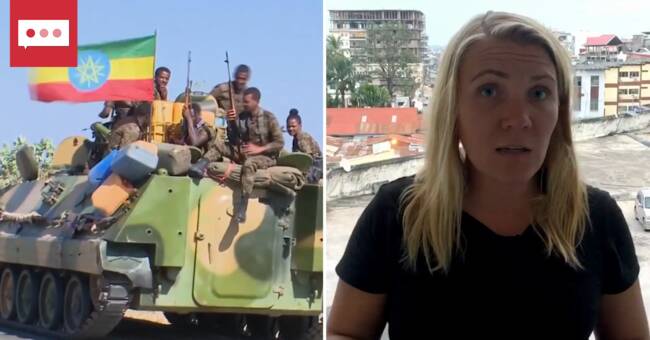Air strikes, knife massacres, hundreds killed, tens of thousands on the run.
It rhymes badly with "peace prize winners".
But just a year after Ethiopia's Prime Minister Abiy Ahmed was awarded the prestigious prize, it is precisely these words that are currently associated with his rule.
For two weeks, fighting has been going on in the Tigray region of northern Ethiopia, on the border with Eritrea.
It was precisely before the peace treaty with Eritrea that Abiy was awarded the Nobel Peace Prize, but not everyone was proud of him, perhaps least of all those in the Tigray region.
Ethiopia is a significant country in the Horn of Africa.
It is the second most populous country on the entire continent and the oldest independent country in Africa.
The headquarters of the African Union are located in the capital Addis Ababa.
The choice - the igniting spark
That the war broke out now was not unexpected, even if it went fast.
The TPLF, the Tigray People's Liberation Front, which is the target of the offensive, ruled Ethiopia for almost three decades before Abiy Ahmed took power in 2018. It came after massive protests against the TPLF regime.
Since then, the new government in Ethiopia has accused the TPLF of the oppression of freedoms and rights that prevailed in Ethiopia during their time in power.
The relationship between Abiy's government and the TPLF has been icy cold and the nail in the coffin became the national election that should have been held in September.
The prime minister decided that the election would be postponed due to the corona pandemic, but the Tigray region held elections anyway.
The government in the capital declared the newly elected leadership in the region invalid, after which they declared that they do not consider Abiy Ahmed's government legitimate because it is not elected by the people.
As a result, the government hijacked relations with Tigray and froze all funding for the region.
After an attack on the federal army base in Tigray, Abiy chose to attack.
The TPLF denies that they carried out the attack.
Earlier this week, the Prime Minister said that the final phase of the offensive is now beginning, indicating that the army intends to take over the capital of the region, Mekelle.
Getting reliable information from Tigray is challenging because the internet is shut down - a weapon Abiy used several times during his time in power.
Aid organizations also do not have access to the region, so an understanding of how extensive the humanitarian crisis is taking place there at the moment is impossible to create.
Ethnic tensions for a long time
Ethiopia is a federal state where different ethnic groups control the different autonomous regions.
Until recently, Ethiopia was ruled by a party coalition consisting of four ethnic parties, led by the TPLF.
In an attempt to abolish ethnic politics, Abiy Ahmed founded a new party, but critics in the Tigray region saw it primarily as an attempt to abolish the federal system and centralize power.
Tigrinya make up about six percent of the population and are the third largest ethnic group in the country, after the Prime Minister's ethnic group Oromo and the Amhara people.
The Amharic region borders Tigray and has expressed support for the government offensive there, although the prime minister also has many enemies among the Amharic.
Abiy Ahmed has made more and more enemies during his time in power.
His own ethnic group is divided in relation to him.
Even when he was awarded the prize, many warned of the powder keg of the ethnic tensions in the country.
Civil war was a nightmare scenario
Tigray has a strong military force and the war threatens to drag on.
A stable Ethiopia is the key to peace throughout the Horn of Africa and there is already a fear that the conflict may spread, not only to other regions of Ethiopia, but also to other countries.
Nearly 30,000 have already fled to neighboring Sudan and missiles have been fired from the Tigray into Eritrea.
Talk of civil war and a divided Ethiopia, like Yugoslavia, was swept away internationally as a "nightmare scenario".
Something that would only happen in the worst case.
Now the nightmare is icy reality.

